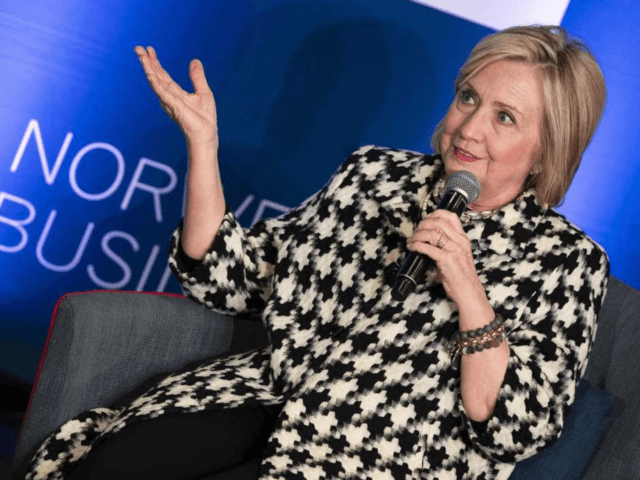Early word has been mixed on the meeting between Secretary of State Mike Pompeo and his Russian counterpart Sergey Lavrov in Sochi, Russia, on Tuesday, but the Russians took a moment to thank Pompeo for trying to restore relations between the two countries and mocked his predecessor Hillary Clinton.
Russian Foreign Ministry spokeswoman Maria Zakharova said on Tuesday the meeting between Pompeo and Lavrov proved “there is a desire and striving to finally launch the process of bilateral relations.”
“Moscow, at least, has been saying that for a long time, but I believe that today the American side said the same in a very positive manner,” she said, describing the meeting as proceeding “very constructively.”
When a reporter asked if the U.S. and Russia could hit the “reset button” on their relationship, Zakharova replied with tongue in cheek, “Such a button which was brought by Clinton, I hope we will never see again.”
Zakharova’s jibe was a reference to the literal “reset button” former Secretary of State Hillary Clinton ostentatiously presented to Foreign Minister Sergei Lavrov in March 2009, seven years before the Democrat Party suddenly decided Russia was the greatest threat to America since World War II. The button was infamously mislabeled “OVERLOAD” in Russian by whoever was assigned to write “RESET” on it.
Pompeo’s very constructive news conference with Lavrov included the Russian Foreign Minister intercepting a question about Russian election interference and launching into a six-minute harangue about how America has been interfering in Russian politics using the Internet.
“We can discuss this topic forever but until we have cold, hard facts on the table we cannot have a grown-up discussion about it. The facts tell us that there is no proof of those trying to hype up this topic,” Lavrov declared.
“You can see we have some disagreements on this issue,” Pompeo deadpanned after Lavrov handed back the microphone.
“I made clear to Foreign Minister Lavrov, as we’ve made clear for the past months that interference in American elections is unacceptable,” Pompeo said. “If the Russians were to engage in that in 2020 it would put our relationship in an even worse place than it has been.”
Pompeo and Lavrov also disagreed about Iran and Venezuela, although Lavrov held out hope that “certain agreements could be reached” on the former. Russia has been strongly critical of the Trump administration’s decision to withdraw from the Iran nuclear deal and is now apprehensive that a military conflict could break out between the U.S. and Iran.
Pompeo said he urged the Russians to reconsider their support for the Venezuelan dictatorship and accept “the time has come for Nicolas Maduro to go.”
“We want every country interfering in Venezuela to cease doing that. We want Venezuela to get their democracy back,” Pompeo said, alluding to suspicions that Russian support was instrumental in persuading Maduro to cling to power when he was nearly dislodged at the beginning of the month.
“Democracy can not be done by force. It’s threats that we hear against Maduro’s government, threats of the mouths of officials… This has nothing in common with democracy,” Lavrov responded, restating Russia’s position that Maduro is the legitimately elected leader of Venezuela.
Despite the verbal sparring between Pompeo and Lavrov over Venezuela, there are rumors Russian President Vladimir Putin personally dislikes Maduro and might be willing to negotiate his exit for the right price, probably a reduction of American military support for Ukraine. American negotiators might believe Putin’s price will go down if he sees Maduro as an increasingly poor investment.
The Kremlin indicated on Tuesday it is open to any format for a meeting between Putin and President Donald Trump, possibly on the sidelines of the G20 meeting in Japan next month. Pompeo met with Putin in Sochi after his discussions with Lavrov, and was reportedly told by the Russian president that his recent phone conversation with Trump convinced him some of the differences between Russia and the U.S. could be resolved.

COMMENTS
Please let us know if you're having issues with commenting.